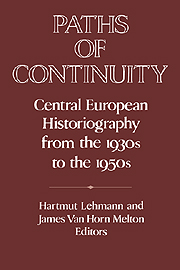Book contents
- Frontmatter
- Introduction: Continuities in German Historical Scholarship, 1933-1960
- 1 German Historiography from the 1930s to the 1950s
- 2 Friedrich Meinecke (1862-1954)
- 3 Change and Continuity in German Historiography from 1933 into the Early 1950s: Gerhard Ritter (1888-1967)
- 4 Hans Rothfels (1891-1976)
- 5 Franz Schnabel (1887-1966)
- 6 Heinrich Ritter von Srbik (1878-1951)
- 7 “Historical Social Science” and Political Myth: Hans Freyer (1887-1969) and the Genealogy of Social History in West Germany
- 8 Some Observations on the Work of Hermann Aubin (1885-1969)
- 9 From Folk History to Structural History: Otto Brunner (1898-1982) and the Radical-Conservative Roots of German Social History
- 10 Werner Conze (1910-1986): The Measure of History and the Historian's Measures
- 11 Continuity, Innovation, and Self-Reflection in Late Historicism: Theodor Schieder (1908-1984)
- Index
2 - Friedrich Meinecke (1862-1954)
Published online by Cambridge University Press: 05 January 2013
- Frontmatter
- Introduction: Continuities in German Historical Scholarship, 1933-1960
- 1 German Historiography from the 1930s to the 1950s
- 2 Friedrich Meinecke (1862-1954)
- 3 Change and Continuity in German Historiography from 1933 into the Early 1950s: Gerhard Ritter (1888-1967)
- 4 Hans Rothfels (1891-1976)
- 5 Franz Schnabel (1887-1966)
- 6 Heinrich Ritter von Srbik (1878-1951)
- 7 “Historical Social Science” and Political Myth: Hans Freyer (1887-1969) and the Genealogy of Social History in West Germany
- 8 Some Observations on the Work of Hermann Aubin (1885-1969)
- 9 From Folk History to Structural History: Otto Brunner (1898-1982) and the Radical-Conservative Roots of German Social History
- 10 Werner Conze (1910-1986): The Measure of History and the Historian's Measures
- 11 Continuity, Innovation, and Self-Reflection in Late Historicism: Theodor Schieder (1908-1984)
- Index
Summary
Friedrich Meinecke (1862-1954) was a central figure of restoration and continuity in the West German historical profession after 1945. Yet this was not without a certain incongruity, for the disintegration of the Weimar Republic, Nazi rule, defeat, occupation, and partition occurred when he was of advanced age, at a point when most of his intellectual generation were in retirement or had died. Retirement also came to Meinecke before the Second World War. In 1932, at the age of sixty-nine, he retired from the University of Berlin. In 1934 he had been compelled to resign as chair of the Historische Reichskommision; and in 1935 he had also been forced to resign from the editorship of the Historische Zeitschrift. In 1936, furthermore, he published his last major work of intellectual history, Die Entstehung des Historismus. The years thereafter were spent in inner exile, “the most private of private individuals,” as he expressed in a letter. Thus by the end of the war Friedrich Meinecke was a man in his eighties, having completed all of his lengthy studies - the biographies of von Boyen (1899) and Radowitz (1913), and the intellectual histories, Weltbürgertum und Nationalstaat (1908), Die Idee der Staatsräson (1924), and Die Entstehung des Historismus (1936).
Information
- Type
- Chapter
- Information
- Paths of ContinuityCentral European Historiography from the 1930s to the 1950s, pp. 49 - 82Publisher: Cambridge University PressPrint publication year: 1994
Accessibility standard: Unknown
- 1
- Cited by
